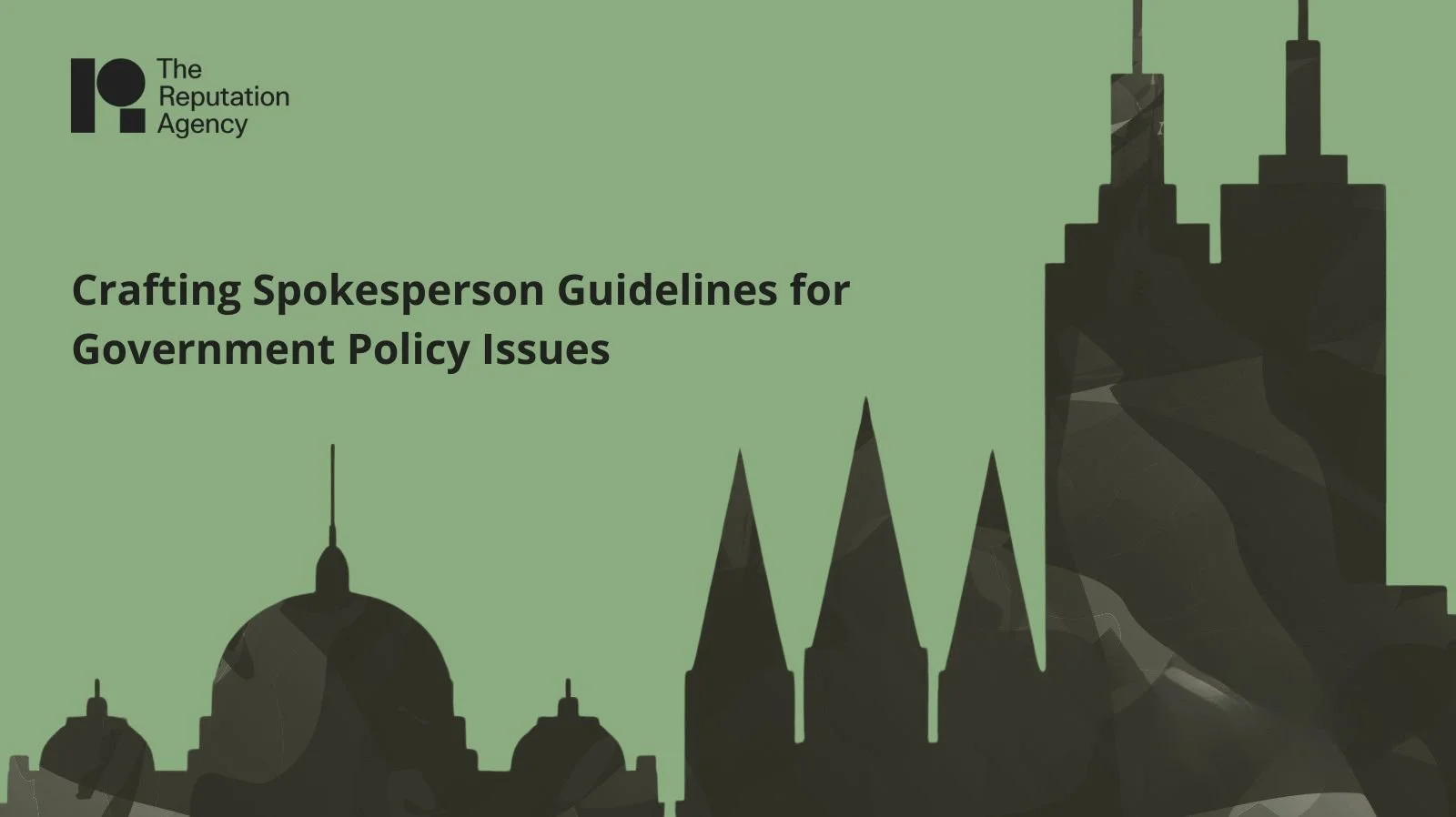Crafting Spokesperson Guidelines for Government Policy Issues
The Importance of Clear Spokesperson Guidelines for Government Policy Issues
Government policy issues often come with complex implications for businesses, non-profits, and other stakeholders. Having a well-defined set of spokesperson guidelines is essential to ensure consistent, clear, and credible messaging. These guidelines provide a framework for how to address sensitive topics, respond to media inquiries, and protect your organisation’s reputation while engaging in public policy discussions.
Key Elements of Spokesperson Guidelines for Government Policy Issues
1. Establish Clear Key Messages
Before your spokesperson speaks publicly on a government policy issue, it’s essential to develop a set of key messages. These messages should:
Align with your organisation’s stance on the policy issue
Be simple, clear, and easy to communicate
Address both the positive impacts and concerns related to the policy
Key messages ensure that your spokesperson is always on point, whether they are speaking with journalists, at conferences, or in interviews.
2. Define the Tone and Language
The tone of your spokesperson’s communication is as important as the content. For government policy discussions, the tone should be:
Professional and respectful: Government policy issues are often contentious, so it’s essential to engage respectfully.
Calm and measured: Avoid inflammatory or overly emotional language, even when expressing concerns or disagreements.
Authoritative and knowledgeable: Your spokesperson should be seen as a trusted authority on the issue, providing clear, well-reasoned insights.
Having a consistent tone reinforces your organisation’s credibility and ensures that your messages are taken seriously.
3. Outline Media Interaction Protocols
A strong set of spokesperson guidelines includes clear protocols for handling media interactions:
Who is authorised to speak: Specify which members of the organisation are designated to speak on particular issues.
When to refer to others: Spokespersons should know when to direct media inquiries to other experts or colleagues, particularly if a question falls outside their area of expertise.
How to handle tough questions: Provide guidance on how to respond to difficult or adversarial questions. For example, how to steer the conversation back to your core messages or acknowledge uncertainty in a professional manner.
These protocols provide consistency and ensure that all spokespersons are aligned in their approach to the media.
4. Addressing Controversial Topics
Government policy issues can be polarising, especially when they affect multiple stakeholders. Spokesperson guidelines should provide specific strategies for addressing controversial topics:
Acknowledge differing viewpoints: While advocating for your position, show an understanding of the concerns of other stakeholders.
Offer solutions or alternatives: Avoid simply opposing a policy. Suggest constructive alternatives or improvements that align with your organisation’s goals.
Stay on message: In the face of controversy, maintain focus on the key messages you want to communicate.
Handling controversial issues effectively requires preparation and a diplomatic approach to avoid escalating tensions.
5. Preparing for Crisis Communications
In some cases, government policy issues can lead to public backlash, regulatory scrutiny, or other reputational risks. Spokesperson guidelines should include crisis communication protocols:
Immediate response plans: Outline how the spokesperson should respond if a crisis arises during media interactions.
Escalation procedures: Provide guidance on when to escalate issues to senior management or external experts.
Crisis messaging: Ensure the spokesperson has prepared messages to address crises in a calm, measured, and transparent manner.
Crisis preparedness is key to mitigating reputational risks when addressing sensitive policy issues.
Did You Know?
Companies with clear spokesperson guidelines are 35% more likely to maintain a positive public image during government policy discussions.
Strengthening Your Brand Through Effective Spokesperson Guidelines
A well-crafted set of spokesperson guidelines not only helps manage media interactions but also ensures that your organisation speaks with one voice on important government policy issues. By maintaining consistent messaging, staying on brand, and being prepared for difficult conversations, you can strengthen your organisation’s reputation and credibility in the public sphere.
Need Assistance with Spokesperson Training?
At The Reputation Agency, we specialise in crafting spokesperson guidelines and providing media training for executives. Explore our corporate communication services to ensure your organisation is prepared for any government policy issue.
FAQs
1. Why are spokesperson guidelines important for government policy issues?
Spokesperson guidelines ensure consistent, clear messaging during media interactions, reduce confusion, and help protect the organisation’s reputation.
2. What should be included in spokesperson guidelines?
Guidelines should include key messages, tone and language advice, media interaction protocols, crisis communication strategies, and how to handle controversial topics.
3. How should a spokesperson handle difficult or controversial questions?
A spokesperson should acknowledge differing viewpoints, stay on message, and offer constructive solutions or alternatives, while remaining calm and professional.
4. Who should be authorised to speak on government policy issues?
The designated spokesperson(s) should have expertise in the issue at hand and be equipped to represent the organisation’s stance clearly and authoritatively.
5. How can organisations prepare for crisis communications in government policy discussions?
By creating immediate response plans, establishing escalation procedures, and preparing crisis messaging, organisations can effectively manage crises related to government policy issues.

